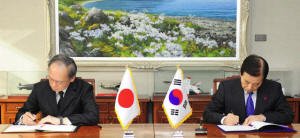|
The South Korean
government went ahead with the deal despite opposition from some
political parties and a large section of the public, who remain
bitter over Japan's actions during its colonial rule of Korea
from 1910 until the end of World War Two.
The signing of the General Security of Military Information
Agreement had originally been expected in 2012, but South Korea
postponed it due to the domestic opposition.
The case for the neighbors to pool intelligence has increased,
however, as North Korea has been testing different types of
missiles at a faster rate, and claims it has the capability to
mount a nuclear warhead on a missile.
"Cooperation between Japan and South Korea is becoming more
important than ever in the security sphere as North Korea's
nuclear (development) and missiles pose a different level of
threat from before," public broadcaster NHK quoted Japanese
Foreign Minister Fumio Kishida as telling reporters in Miyagi
Prefecture, northeastern Japan. "Signing of the pact has a very
important significance."
In Beijing, which is North Korea's most important supporter
despite Chinese anger at its missile and nuclear tests, the
foreign ministry said the agreement would add to tensions on the
Korean peninsular.
"This will add a new unsafe, unstable element for northeast
Asia," ministry spokesman Geng Shuang told a daily news
briefing.
South Korea's Defence Minister Han Min-koo and Japan's
ambassador to the South, Yasumasa Nagamine, inked the agreement
in Seoul, according to the South Korean defense ministry.
A survey by Gallup Korea on Friday showed that 59 percent of
1,007 respondents opposed the agreement between the two
countries.
Many of protesters demanding President Park Geun-hye to resign
over a influence-pedaling scandal also insisted Park withdraw
the military information sharing agreement with Tokyo.
A defense ministry official said South Korea now has deals with
33 countries, including the United States and Russia, on
military intelligence sharing.
(Reporting by Ju-min Park; Additional reporting by Ben Blanchard
in Beijing and Tetsushi Kajimoto in Tokyo; Editing by Simon
Cameron-Moore)
[© 2016 Thomson Reuters. All rights
reserved.] Copyright 2016 Reuters. All rights reserved. This material may not be published,
broadcast, rewritten or redistributed.
 |
|






